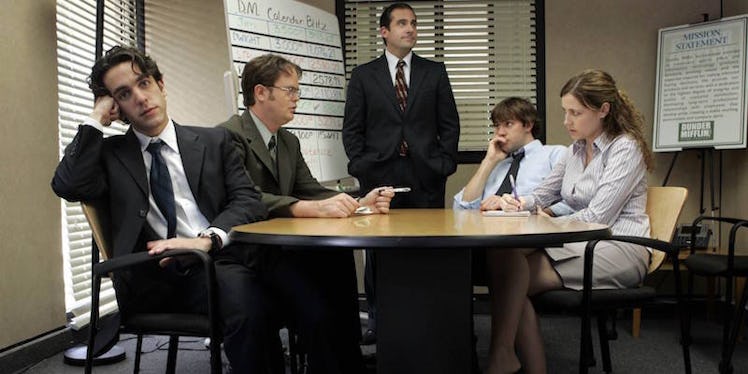
Why Being Self-Aware Is The Key To Getting Ahead In The Workplace
Self-awareness is a rarely mastered workplace trait. And I'm speaking as someone who's still working toward that mastery.
Have you ever asked yourself questions like, “Am I the villain of this planning meeting? Have I become the amiable dunce in the corner cubicle? Am I really the hero of this group exercise?” If you have, that's great. You're probably more self-aware than the majority of your peers.
But still, do you really have a clue how you're actually perceived by your colleagues? If not, maybe it would be helpful to ask yourself this question: What movie character am I?
That may sound like an odd proposition, but when maneuvering through one-on-one and group interactions at work, I recently started examining my place and pondering two thoughts: “If this were a film, what would the audience think of my role?” and “How does my character fit in with the rest of the cast?” I'll be honest: I don't always love the answer.
Looking back on my career, it's pretty sobering to consider how often I've really been the “jerk” in a professional situation, or the “obstructionist” on a project, having no idea — while everyone else was extremely aware — of my true role.
The Best Professionals Know Their Role
I think some people are inherently self-aware, while others hone that skill throughout the course of their life experiences. But really, I think most people spend their entire time on Earth unable to see themselves with a clear vision. That's incredibly unfortunate for them, as well as the people around them.
What I've realized about self-awareness (or “perspective”) is that the most highly functional and effective people — whether they're in business, sports, politics, etc. — always seem to have a great understanding of their characters' positions. These people have incredible self-awareness, and they turn it into a masterful stage presence.
At the other end of the spectrum, the people who perform poorly often think of themselves as Steve Jobs reincarnations, when they're really Michael Scott caricatures.
We've All Played Michael Scott Before
Over the past few years of my career, I can think of numerous instances when I've been in a room full of people smarter than me, and I've done all the talking (playing “the rambling idiot”), when I was trying to be “the great facilitator.”
At other times, I've tried to be “the hero,” shouldering too many initiatives in an attempt to lighten the burdens of those around me. Though I was wanting to help, in reality, I was seen by my colleagues as the “hoarding control-freak,” taking the fun out of everyone's jobs.
There have also been moments when I was trying to be “the calm and collected leader,” but I was really seen as “the cold and distant manager.” It's pretty scary sometimes when you begin understanding the audience's (read: your co-workers) perspective, realizing it is nothing like the character you thought you were playing.
In that vein, one of my favorite television lines is from an episode of "Mad Men." Don Draper's niece, Stephanie, says something like, “Do you know what drives me crazy about people? They go their whole lives not knowing what's wrong with them, and strangers know within the first five minutes.” It's too true.
How To Learn Your True Character
Because the world has countless “movies” happening at once — with sets, characters and plots intertwining — you can be the hero to one person, and simultaneously the villain to someone else. That said, it's hard to get a pure 20-20 look at yourself sometimes.
What is important, though, is you understand who you are at your core, what you're good at, what you should be doing and what you want for yourself and those around you. Then, square that grounding with a healthy dose of empathy to gain a sense of mindfulness. Sure, this may seem a bit overwhelming, but some people can do it. And the ones who do are extremely effective.
When working with teams, friends and family, always be asking yourself who you are in a particular situation. If you don't like the answer, do something about it.